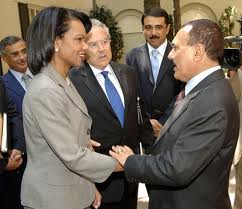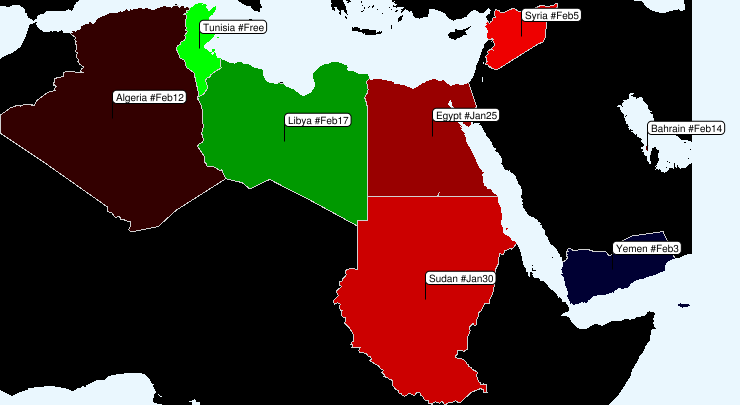 Protesters in south Yemen called for the secession of the once independent south today. Security forces were out early in the day with tanks and police to force protesters back inside. Scores of protesters were moved off of the streets of Aden, but dozens managed to get out in Crater, Khor Maksar, and Al-Mansura, and several hundred people in Zinjibar. Police in Al-Masura, fired warning shots and tear gas. Some reports say thousands of protesters were out in all provinces.
Protesters in south Yemen called for the secession of the once independent south today. Security forces were out early in the day with tanks and police to force protesters back inside. Scores of protesters were moved off of the streets of Aden, but dozens managed to get out in Crater, Khor Maksar, and Al-Mansura, and several hundred people in Zinjibar. Police in Al-Masura, fired warning shots and tear gas. Some reports say thousands of protesters were out in all provinces.
As WL Central reported on February 1, President Ali Abdullah Saleh had announced that he would step down after his second presidential term expires in 2013. Subsequent cables released by Wikileaks indicate that may have been more of a prearranged concession to the US than to the protesters. Cable 05SANAA1790 from June 2005 says regarding Saleh, "Domestically, however, he has run-out of reforms he can implement at no political cost to himself. Increasingly anxious about upcoming Presidential elections, and already preoccupied with succession, it is unlikely Saleh will allow a viable opposition candidate to challenge him in 2006. The visit is an opportunity to pressure Saleh not to amend the constitution so he may run again in 2013 by praising him for bringing Yemen to the point where he can rely on the system in place to produce a legitimate successor. The inducement here might be a public show of support via a greater role in public fora such as the G-8."
Abdul Ilah Shayi
Poverty and repression under President Ali Abdullah Saleh’s government in Yemen has moved Yemenis to mount an uprising. The “Day of Rage” yesterday was another demonstration intended to force Saleh to resign.
News organizations like NPR have reported since the revolt in Tunisia that Saleh has “ordered income taxes slashed in half and instructed his government to control prices” and “deployed anti-riot police and soldiers to several key areas in the capital and its surroundings to prevent riots.” But those moves have not stopped protests from taking place.
As highlighted in a previous post, Saleh has brutally neglected the needs of his people. According to NPR, “Nearly half of Yemen's population live below the poverty line of $2 a day and doesn't have access to proper sanitation. Less then a tenth of the roads are paved. Tens of thousands have been displaced from their homes by conflict, flooding the cities.”
While Egyptians continue to maintain their uprising against President Hosni Mubarak with a “Day of Departure" today, it is worth looking at what happened in Yemen yesterday. An opposition coalition of Yemenis mobilized in defiance of a plea from President Ali Abdullah Saleh to not protest, rally or engage in any sit-ins, and held their own "Day of Rage."
The protests were considered to be the largest anti-government demonstration that Saleh has “faced in his 32-year rule.” The Guardian reported protesters chanted, “Together we fight against poverty, corruption and injustice.” Given what has been happening in Egypt, the protesters hoped to mobilize in their Tahrir Square, but the government “beat them” to the Square and sent “hundreds of tribesmen to camp out there overnight.”
Protesters called for Saleh to “form a new government” and “let the Yemeni people decide who will rule them in clean, fair elections.”
Map via @Houeida Anouar

Tunisia December 15:
2011-02-01 Tunisian Islamic Leader Returns as EU Freezes Ousted President's Assets
2011-01-27 Tunisia protests continue as a warrant is issued for Ben Ali
2011-01-24 Tunisia today: "It’s not a unity government, it’s a fake unity government”
 The Interior Ministry of Yemen issued a statement on its website outlining extra security measures it has taken in preparation for Yemen's Day of Rage on February 3. Security forces have been reinforced around Sanaa, the capital, and transportation routes into major cities have security checkpoints added for 'wanted suspects' or firearms. The opposition parties have called for a million protesters march in emulation of Egypt's current demonstrations and asked for members and other supporters outside the capital to join. Around 15,000 protesters marched in Sanaa last Thursday.
The Interior Ministry of Yemen issued a statement on its website outlining extra security measures it has taken in preparation for Yemen's Day of Rage on February 3. Security forces have been reinforced around Sanaa, the capital, and transportation routes into major cities have security checkpoints added for 'wanted suspects' or firearms. The opposition parties have called for a million protesters march in emulation of Egypt's current demonstrations and asked for members and other supporters outside the capital to join. Around 15,000 protesters marched in Sanaa last Thursday.
President Ali Abdullah Saleh announced last week on state TV that he would step down after his second presidential term expires in 2013. He is to address an emergency meeting of the two chambers of the parliament, the House of Deputies and the Shura Council, tomorrow, one day before Yemen's Day of Rage. He is to discuss "issues and developments of interest to the nation and citizens" according to the official Saba news agency.
On January 27 tens of thousands of people in Yemen took to the streets calling for an end to the government of Ali Abdullah Saleh, the president. Today, Al Jazeera reports dozens of activists clashing with government supporters in Sanaa, the capital of Yemen. They chanted "Ali, leave leave" and "Tunisia left, Egypt after it and Yemen in the coming future" outside the Egyptian embassy.
Tawakel Karman, who heads the Yemeni activist group Women Journalists Without Chains, and is also a member of the opposition Islamist party al-Islah, was arrested last week and charged with organizing unlicensed demonstrations without permission. She had been involved in organizing a protest last week of around 2,500 demonstrators who chanted "Oh, Ali, join your friend Ben Ali", a message to the president of Yemen and in support of the departure of the president of Tunisia. Nearly half of Yemen's population lives on less than $2 a day. There is poor access to proper sanitation, less than a tenth of the roads are paved, and tens of thousands have been displaced from their homes by conflict. The government is reported to be very corrupt.
There were massive anti-government rallies in Yemen today. Inspired by events in Tunisia and Egypt, tens of thousands took to the streets of the country's capital, Sanna to demand President Ali Abdullah Saleh's resignation.
Protests have spread across the Middle East in the wake of Tunisia's popular uprising set in motion by the self-immolation of Mohamed Bouazizi, resulting in the intimidation, arrest, and imprisonment of dissident voices and journalists. Governments in the region have responded with both carrots and sticks. A short round-up of significant events over the weekend in Yemen, Jordan, and Algeria.
Yemen: Reporters Without Borders: Arrests and threats against journalists.
... Tawakkol Karman, the head of the NGO Women Journalists Without Chains, ... was arrested for unclear reasons in the capital, Sanaa, yesterday evening following a protest in the city in the afternoon. Her family said she is being held in Sanaa’s main prison. Yesterday’s demonstration was part of a 10-day-old wave of protests in Yemen inspired in part by the protests in Tunisia. Around 20 people have been reportedly arrested. ... More than 200 journalists took part in a march this morning to demand their release.
A 25 year old Yemeni youth set himself on fire in the Radaa province to the south of the capital city Sanaa today, alluding to the "stick of security" being used to deal with any demonstrations in the country.
Yemini sources say that he is now in intensive care in a hospital in Sanaa, where his condition remains critical.
Sanaa saw popular demonstrations for the fourth consecutive day in support of the popular Sidibouzid movement in Tunisia. Demonstrations were mostly peaceful escept at Sanaa Unniversity, where the campus was turned into a military barracks after hundreds of students participated in demonstrations there. The Yemini Ministry of Interior has declared any marches or demonstrations illegal, according to a security source in the ministry, declaring that such bans are not inconsistent with Yemen's constitution.
Clashes with the government have continued now for more than a week in the cities of Habilayn, Radfan and Lahj.
Previously on WL Central:Unrest in Arab States
The Guardian: WikiLeaks cables blame Chinese government for Google hacking
"The hacking of Google that forced the search engine to withdraw from mainland China was orchestrated by a senior member of the communist politburo, according to classified information sent by US diplomats to Hillary Clinton's state department in Washington.
The leading politician became hostile to Google after he searched his own name and found articles criticising him personally, leaked cables from the US embassy in Beijing say.
That single act prompted a politically inspired assault on Google, forcing it to "walk away from a potential market of 400 million internet users" in January this year, amid a highly publicised row about internet censorship."
Read more
The Guardian: WikiLeaks cables: Spanish PM helped GE beat Rolls-Royce to helicopter deal
"Rolls-Royce lost a lucrative contract to supply helicopter engines to the Spanish military because of a personal intervention by Spain's prime minister, José Luis Zapatero, following vigorous lobbying from US diplomats, according to a secret cable from the US embassy in Madrid.
Eduardo Aguirre, the departing US ambassador to Spain, recounts behind-the-scenes diplomatic machinations that helped General Electric snatch a deal away from Rolls-Royce to provide engines for a state-of-the-art fleet of helicopters bought by the Spanish armed forces, a contract estimated by industry experts to be worth more than £200m.
Details of how Britain's best-known engineering company lost out to the Americans will fuel concerns that the so-called UK-US special relationship does not always deliver results."
Read more
Theme by Danetsoft and Danang Probo Sayekti inspired by Maksimer